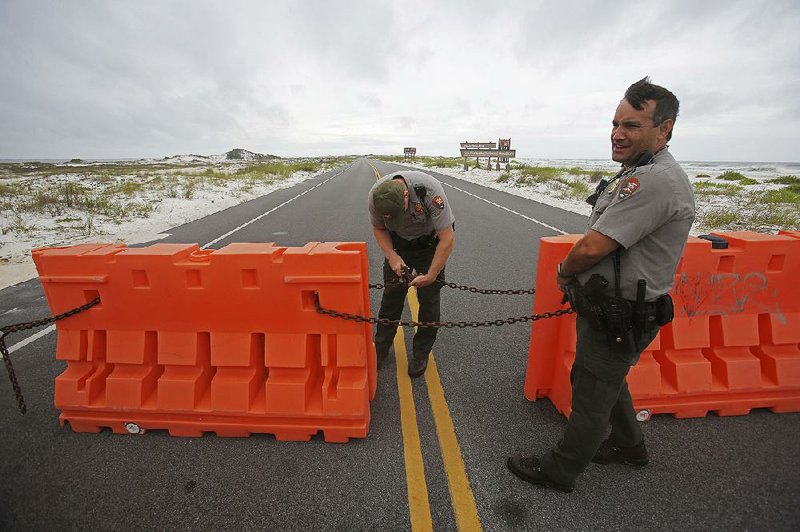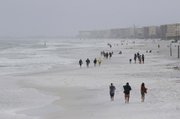Alberto lumbered ashore Monday on the U.S. Gulf Coast as a subtropical storm, pelting white sand beaches with blustery winds and stinging rain that kept the usual Memorial Day crowds away, before weakening to a subtropical depression.
Forecasters warned that heavy rain, flash flooding and dangerous surf posed the biggest threats as Alberto's ragged core made landfall near Laguna Beach in the Florida panhandle. A few brief tornadoes also were possible in much of Florida and parts of Georgia, South Carolina and Alabama.
The National Hurricane Center in Miami said at 10 p.m. Monday that Alberto was centered about 50 miles west-northwest of Dothan, Ala. With maximum sustained winds of 35 mph, Alberto was moving north at 12 mph.
Between 4 and 8 inches of rain could pummel the Florida panhandle, eastern and central Alabama, and western Georgia before the storm moves on. Isolated deluges of 12 inches also were possible as the storm heads inland, threatening heavy rains around the Southeast.
Forecasters said Alberto could then spread rains today over the Tennessee Valley and later in the week around the Ohio Valley and Great Lakes region.
A subtropical storm has a less defined and cooler center than a tropical storm, and its strongest winds are found farther from its center.
Authorities did not immediately attribute any deaths or injuries directly to Alberto. But in North Carolina, a television news anchor and a photojournalist were killed Monday when a tree that had been uprooted from rain-soaked ground toppled on a TV vehicle as the two reported on severe weather on the fringes of the system, hundreds of miles from Alberto's center.
Lifeguards posted red flags along the white sands of Pensacola Beach, where swimming and wading were banned.
Meanwhile, the storm forced some Memorial Day tributes to be canceled across northern Florida. Safety was the priority, but the decision was still a "heartbreaker," said Tom Rice, a 29-year-old Army veteran who leads the organizations that planned a ceremony Monday at Beal Memorial Cemetery in Fort Walton Beach.
Some stragglers still made their way through the rain to pay tribute at the cemetery's Veterans Tribute Tower, however. Rice said American flags had been placed Saturday on the graves of all 1,700 veterans buried in the cemetery.
"We got the flags out," Rice told the Northwest Florida Daily News as wind whipped a massive U.S. flag flying at half-staff. "That's what's important."
Along the Florida Panhandle coast known for its pristine beaches, tourists vowed Alberto wouldn't dampen their vacations.
Jason Powell said he was seeking to keep his children entertained until Alberto blew past their vacation spot.
"So far we've seen a lot of wind and the ocean is really high, covering up the entire beach," Powell said. "We're not letting it ruin our vacation ... we're going to watch some movies inside and a little TV, and hopefully maybe even get into the pool" despite the rain.
Janet Rhumes said her group of friends from Kansas had been planning their Memorial Day weekend on Navarre Beach since October. They stocked up on groceries and planned to play card games. No storm could deter them.
"We've never seen one before and we're here celebrating a friend's 20th birthday," Rhumes told the Daily News. "So how often can you say you rode a storm out?"
The mayor of Orange Beach, on Alabama's Gulf Coast, said Alberto brought rain and aggravation -- and dashed hopes for record Memorial Day crowds. Instead, red flags flew on Alabama beaches and officers patrolled, making sure no one entered the water.
"From an economic standpoint most of the damage is already done, probably $600 [million] or $700 million worth of lost economic activity due to rain, warnings and preparations," said Chuck Watson, a disaster modeler at Enki Research in Savannah, Ga. "Alberto might cause a couple hundred million in damage at worst when it does make landfall, and there is still flooding potential."
Hardest hit will be small businesses that expected revenue from Memorial Day weekend tourists, Watson said.
On Friday, Exxon Mobil Corp. pulled nonessential personnel from its Lena oil production platform and Royal Dutch Shell PLC shut in its Ram Powell hub. Chevron Corp. stopped oil production and evacuated personnel from its Blind Faith and Petronius platforms Saturday, but resumed operations on Monday.
Most other energy companies left offshore crews in place while they watched 2018's first Atlantic storm. Alberto formed several days ahead of the June 1 official start of the six-month Atlantic hurricane season.
Storms in the Gulf are closely watched because 5 percent of U.S. natural gas and 17 percent of crude-oil production comes out of the region, according to the Energy Information Administration. Onshore areas along the coast also account for about 45 percent of U.S. refining capacity and 51 percent of gas processing.
Elsewhere, Florida's Division of Emergency Management said, about 2,600 customers were without power in northwestern Florida on Monday morning.
Scarlett Rustemeyer, a barista at the Fosko Coffee Barre in Pensacola Beach, said she always frets about power failures whenever storms bluster through.
"My boyfriend and I usually try to go to the store and stock up on lots of bottled water, and get like canned goods and things that won't go bad if our power goes out," she said.
Elsewhere, a television station serving parts of both North and South Carolina said Monday that two members of its news team were killed as they reported on flooding and severe weather.
WYFF-TV Anchor Mike McCormick and photojournalist Aaron Smeltzer both worked in the Greenville, S.C., market for more than a decade, anchor Carol Goldsmith said on air, breaking the news. McCormick worked for KHBS/KHOG from 2005 to 2007, the Northwest Arkansas TV station said.
The men were driving on U.S. 176 near Tryon when the large tree fell on their vehicle, North Carolina Highway Patrol Master Trooper Murico Stephens said.
McCormick and Smeltzer had just interviewed Tryon Fire Chief Geoffrey Tennant. They told Tennant to be careful with Alberto's remnant expected to bring more heavy rains and mudslides this week. He told them to be careful, too.
"Ten minutes later we get the call and it was them," Tennant said at a news conference, his voice cracking.
Neither Stephens nor Tennant directly blamed the up to 2 inches of rain that fell Monday from the fringes of Alberto for the deaths. The fire chief said the roots of the 3-foot diameter tree were loosened in ground saturated by a week's worth of rain.
Alberto, the first named storm of 2018, got an early jump on the Atlantic hurricane season. Alberto is the ninth named storm to make landfall on the continental United States before June 1 on record.
The National Oceanic and Atmospheric Administration released the annual hurricane season forecast Thursday in which they call for 10 to 16 named storms, with five to nine hurricanes. One to four hurricanes could be "major" with sustained winds of at least 111 mph.
If that forecast holds, it would make for a near-normal or above-normal season. An average hurricane season produces 12 named storms, of which six become hurricanes, including three major hurricanes.
Information for this article was contributed by Jennifer Kay, Kate Brumback and Jeffrey S. Collins of The Associated Press; by Brian K. Sullivan, Sheela Tobben, David Wethe, Amy Stillman, Kevin Crowley and Ben Sharples of Bloomberg News; and by Brian McNoldy of The Washington Post.
A Section on 05/29/2018


